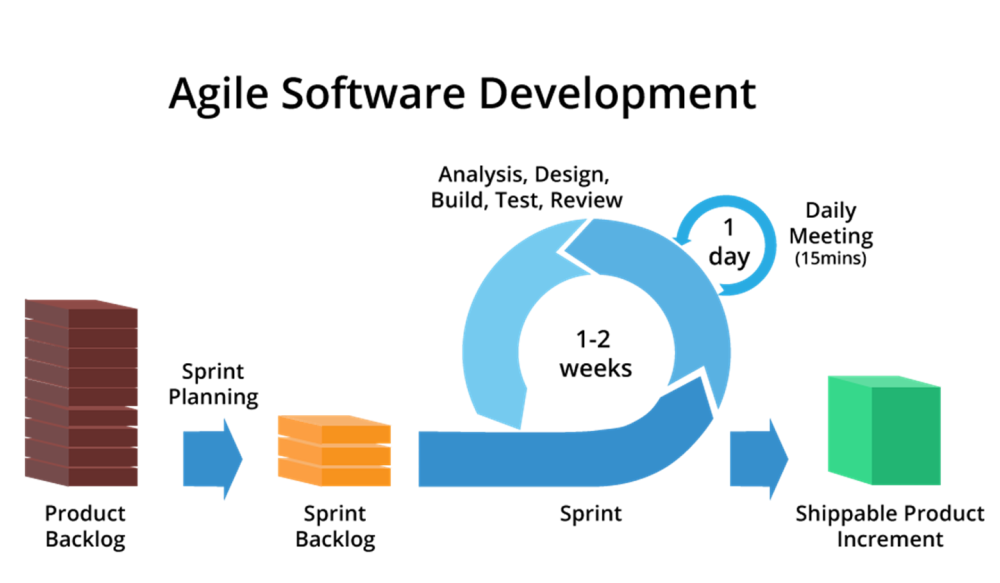- info@sparksensesolutions.com
- (+1) 346-636-1322
89-23 Pontiac street queens village, NY, 11427

Meanwhile, the agile methodology has gained widespread adoption for itsemphasis on collaboration, adaptive planning and continual improvement.
In today's fast-paced digital landscape, software development processes must evolve continually to keep pace with changing technologies and user needs. Traditional waterfall approaches lack the flexibility required. Meanwhile, the agile methodology has gained widespread adoption for itsemphasis on collaboration, adaptive planning and continual improvement.
By embracing true agility, development teams can radically boost productivity, quality and client satisfaction. However, success requires mastering agile best practices through ongoing skill development. Here are some essential techniques for coders seeking to elevatetheir craft.
Break projects into short, focused iterations or sprints lasting one to four weeks. Frequent release ofworking, tested code allows continuous feedback incorporation. Rather than big bangs, focus onincremental value delivery through prioritized backlogs and minimal viable products.
Colocate team members with complementary skills rather than siloing functions. Pair programmers to share knowledge. Rotate flexible team members between roles like coding, testing and product ownership for diverse skill building. Frequent Collaboration keeps work evolutionary.
Empower autonomous teams with minimum oversight. Cross-trained members determine optimal workflow with daily stand-ups, estimates, and retrospectives. Leadership coaches rather than micromanages progress. Teams adjust practices based on empirical outcomes for perpetual optimization.
Automated testing catches errors earlier andfaster than manual QA. Write short, targeted testsbefore each incremental feature or fix. Refactoras needed and re-run full test suites often. Well-tested codeenables fearless refactoring.
Programmers integrate code changes daily or even multipletimes daily on a shared codebase rather than merging branches periodically. Automated builds and deployment with each check-in prevent integration issues. Quickly identify inconsistencieswith a stable base.
Retrospective meetings after each sprint identify what's working and opportunities forimprovement. Make data-driven decisions to refine processes incrementally based onempiricalevidence rather than opinions. Transparently share lessons across teams.
Mastering agile best practices through hands-on applied learning yields unparalleledcode quality and career development. View each project as an opportunityto expand mastery of new techniquesbenefiting clients and personalgrowth.Coding excellence emerges fromcontinuous self-improvement throughreflection and adaptation.
Agile ways of working demand flexibility but also diligence. Software crafters whoroughly understood and refined agile practices through ongoing experiential learningwill remain at the cutting edgeready to partner creatively wherever client needs evolve. Their mastery propelsboth individual prosperity andpositively impacts lives throughhigh-quality, purposeful software.
Adopt modern tools that facilitate agility like source control systems, continuous integration servers, bug and issue trackers, collaboration software.
● Participate in programming communities and conferences to learn new techniques, share knowledge and network with fellow coders.
● Pair programming, mob programming and code reviewing cultivate a collaborative learning environment within the team.
● Estimation skills develop over time through data analysis of velocity, story points and accurate tracking of time spent on tasks.
● Don't be afraid to fail fast when piloting new ideas. Retrospectives help identify what worked and iterate smoothly.
● Maintain clean, well-documented code through standards and automatic linting/formatting. Leave it in a better state than receive
● Continually broaden technical skills through self-education on emerging trends like cloud, mobile, AI, blockchain, etc.
● Mentoring more junior developers helps impart best practices while solidifying one's own learning.
● Certifications demonstrate expertise but nothing substitutes extensive hands-on project experience applying agile principles.
● Thrive under pressure of tight deadlines through excellent time management, prioritization and commitment to quality outcomes